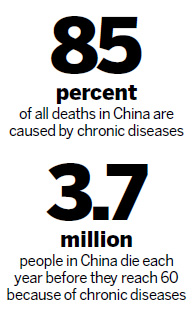Society
Chronic diseases country's top killer
By Shan Juan (China Daily)
Updated: 2011-05-30 07:25
 |
Large Medium Small |
Chongqing - Chronic diseases, including heart disease, stroke, cancer, chronic respiratory diseases and diabetes, are the leading cause of mortality in China, representing 85 percent of all deaths, said a senior health official.
Kong Lingzhi, deputy director of the disease prevention and control bureau under the Ministry of Health, made the remarks on Saturday at the Forum of Prevention and Control of Chronic Disease.

"China is facing a great challenge from chronic diseases, which has a serious impact on both the economy and society," said Kong.
Each year, about 3.7 million people die before they reach 60 because of chronic diseases. There are currently 200 million hypertension patients and 90 million diabetics in China, official statistics show.
To address the challenge, "the government is now drafting an inter-ministerial roadmap for chronic disease intervention, which will set targets, define responsibilities and distribute guidelines for the prevention and control of chronic diseases," she said.
The initiative aims to strengthen national and global monitoring and surveillance; scale up the implementation of evidence-based measures to reduce risk factors, such as tobacco use, an unhealthy diet, physical inactivity and harmful alcohol use; and improve access to cost-effective healthcare to prevent complications, disabilities and premature death.
But more importantly, the roadmap will help gain attention and support for preventing and controlling chronic diseases and place it high on government working agendas, Kong explained.
The government has focused more on addressing instant health crises up to now and policy and funding support for chronic disease control and prevention was very limited, admitted Mao Qun'an, spokesman of the ministry.
Given that chronic disease control requires a systematic approach, tasks such as public health education, training for medical workers (especially the grassroots ones) and policies encouraging doctors' involvement need to be carried out, he said.
The ultimate goal is to prevent people from getting ill rather than treating diseases, he added.
Lei Zhenglong, deputy director of the disease prevention and control bureau, said that to enhance the capacity of medical workers was now the top priority for the initiative.
At present, effective disease prevention work usually contradicts the financial interests of clinical doctors, analysts said.
A respiratory disease doctor surnamed He with the Peking University People's Hospital said that he came under pressure from the hospital authorities when the number of inpatients declined due to his efforts to inform his patients about chronic disease prevention.
| 分享按钮 |